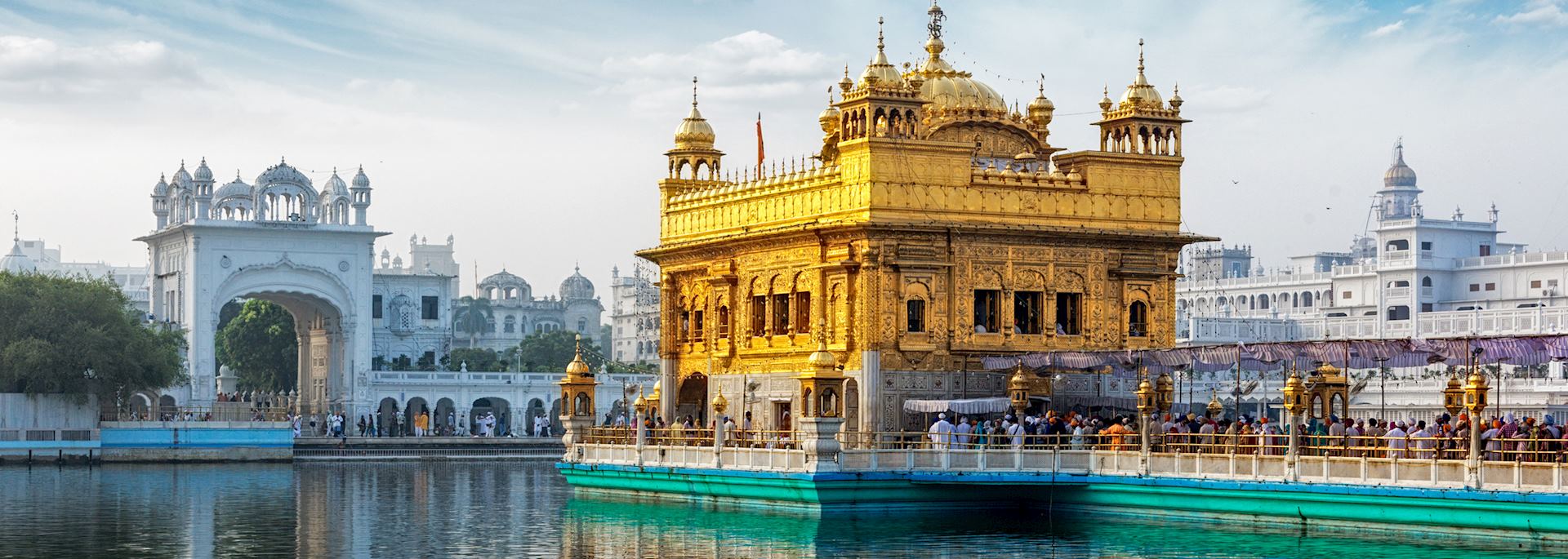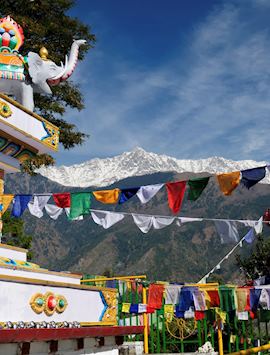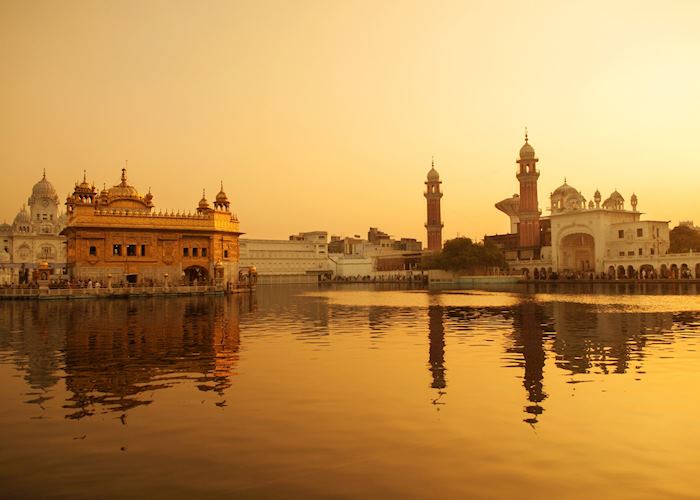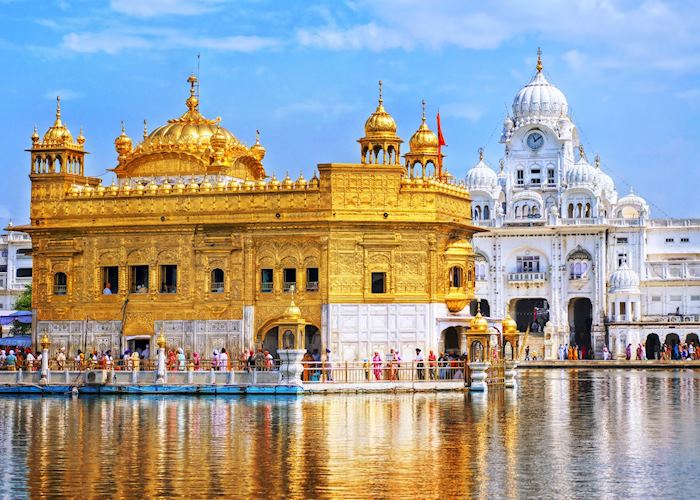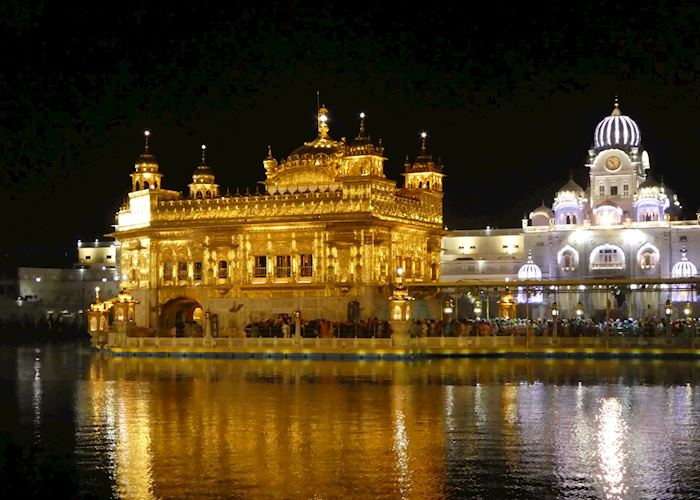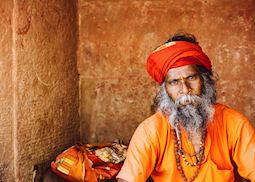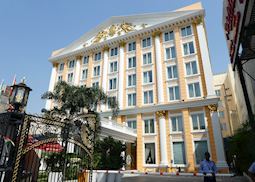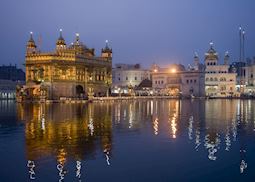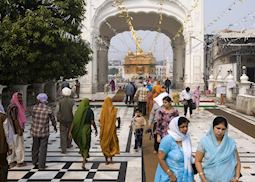Jump to:
Guru Amar Das, a founding Sikh leader, chose the small village of Amritsar as the location of a holy shrine in the late 16th century. Since then, it has bloomed into one of the Punjab’s largest cities. Set between the summer capital of the British Raj, Shimla, and the Pakistani city of Lahore, Amritsar has stood fast through colonial occupation, religious dissent and the partition of India and Pakistan.
The Golden Temple
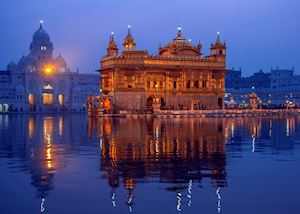 The Taj Mahal might have become India’s best-known sight, but we’d argue that Amritsar’s Golden Temple is a worthy rival. It marks Amritsar as the holiest city for Sikhs, attracting thousands of pilgrims each year. It’s worth visiting just to see the shrine illuminated at night, when it seems to float in the sarovar (water tank) that surrounds it.
The Taj Mahal might have become India’s best-known sight, but we’d argue that Amritsar’s Golden Temple is a worthy rival. It marks Amritsar as the holiest city for Sikhs, attracting thousands of pilgrims each year. It’s worth visiting just to see the shrine illuminated at night, when it seems to float in the sarovar (water tank) that surrounds it.
The Guru Granth Sahib (the Sikh scripture) is displayed within the shrine, surrounded by floral offerings and so much gilding that the room seems to glow. You’ll hear rhythmic chanting as worshipers walk around the chamber in a clockwise direction (non-Sikhs are welcome too). Each evening, the holy book is paraded in front of jostling crowds before being put to bed in an elaborate ceremony.
The temple is part of a larger complex that includes a research institute, library and museum commemorating those killed during Operation Blue Star in 1984. You’ll see pilgrims bathing in the water, which is believed to have healing properties. And, there’s a huge kitchen run by volunteers (anyone is welcome to help roll chapatis, serve food or wash up), who encourage all visitors, regardless of race or religion, to sit down and eat together in the dining hall.
Away from the temple
A short walk from the temple is Amritsar’s old city, a red-walled labyrinth of Hindu temples and carved wooden doors that lead to courtyards strung with washing. The bazaar sells rows of red bangles, reams of bright sari fabric and shiny rows of metal cookware. You can also walk around Jallianwala Bagh, a public garden with a memorial to more than 1,000 Punjabis who were killed in 1919 when a troop of British soldiers opened fire on them as they held a nationalist gathering.
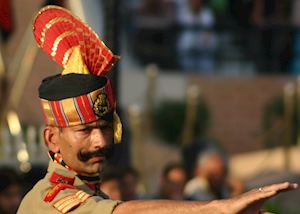 After the partition between India and Pakistan in 1947, Amritsar sat just 28 km (17 miles) from the border. The town of Wagah became a border post, and over the following years the daily closure of the border has turned into an elaborate ceremony. Tiered seating on each side gives you a vantage from where you can cheer on the guards of both nationalities as they perform a series of maneuvers that look more like dance performances than army drills.
After the partition between India and Pakistan in 1947, Amritsar sat just 28 km (17 miles) from the border. The town of Wagah became a border post, and over the following years the daily closure of the border has turned into an elaborate ceremony. Tiered seating on each side gives you a vantage from where you can cheer on the guards of both nationalities as they perform a series of maneuvers that look more like dance performances than army drills.
Once the parading is over, both countries’ flags are painstakingly lowered in tandem, there’s a brief handshake between soldiers, and the iron gates are locked. If you’d like to learn more about the separation of India and Pakistan, the Partition Museum opened in Amritsar in 2016 with a collection of photographs and interviews from those who were affected.
Amritsar has a well-connected airport with flights to Delhi, from where you can catch your international flights. It works well as a starting point for exploring the western foothills of the Himalaya, including Shimla and Dharamsala.
The best time to visit Amritsar
Amritsar is at its best from October to March, when the weather stays relatively warm, although temperatures can dip from mid-December to January. From April onward, temperatures begin to rise and can hit 104°F (40°C), and the monsoon rains tend to arrive around July. If you’re happy with a little humidity, the temperatures have begun to cool by September at a time that represents good value for travel.
who's been there
-
617-223-4521617-223-4195
- Make an inquiry
Suggested itinerary featuring Amritsar
This sample itinerary will give you an idea of what is possible when you travel in Amritsar, and showcases routes we know work particularly well. Treat this as inspiration, because your trip will be created uniquely by one of our specialists.
Places near Amritsar
- Pragpur 81 miles away
- Dharamshala & McLeod Ganj 95 miles away
- Shimla 141 miles away
- Mussoorie 207 miles away
- Ladakh 214 miles away
- Alchi 224 miles away
- Haridwar 228 miles away
- Rishikesh 230 miles away
- Leh 236 miles away
- Delhi 251 miles away
- Bikaner 267 miles away
- Nubra Valley 268 miles away
- Corbett Tiger Reserve 279 miles away
Photos of Amritsar
Our expert guides to exploring Amritsar
Written by our specialists from their own experiences of visiting Amritsar, these guides will help you make the most of your time there. We share both our practical recommendations and the best ways to appreciate Amritsar at its best.
-
What to do in India: our highlights guide ![Sadhu in Varanasi]()
What to do in India: our highlights guide
What to do in India: our highlights guide
Our India specialists pick some of their best things to see and do, and where to stay from the Himalaya to Kerala. Include spotting tiger, staying in a palace in Rajasthan, taking a boat trip down the Ganges and experience one of the country’s many festivals in your trip to India.
Read this guide
Accommodation choices for Amritsar
We've selected a range of accommodation options for when you visit Amritsar. Our choices usually come recommended for their character, facilities and service or location. Our specialists always aim to suggest properties that match your preferences.
-
![Taj Swarna, Amritsar]()
Taj Swarna
Amritsar -
![Ranjit's Svaasa, Amritsar]()
Ranjit's Svaasa
Amritsar -
![Ramada, Amritsar]()
Ramada by Wyndham
Amritsar
Ideas for experiencing Amritsar
Our specialists seek out authentic ways to get to know the places that could feature in your trip. These activities reflect some of the experiences they've most enjoyed while visiting Amritsar, and which use the best local guides.
-
Golden Temple ‘putting to bed’ ceremony ![Golden Temple, Amritsar, India]()
Golden Temple ‘putting to bed’ ceremony
Golden Temple ‘putting to bed’ ceremony
This daily ritual of putting the Holy Scripture to bed is a sight not to be missed on a visit to the Golden Temple.
View details -
Discover Amritsar ![Golden Temple, Amritsar, India]()
Discover Amritsar
Discover Amritsar
Explore Amritsar, Sikhism’s holiest city. Meaning 'Pool of the Nectar of Immortality', it is justly famed for its Golden Temple, a sacred shrine gilded with 100 kilograms of gold.
View details
